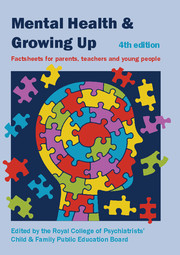Book contents
- Frontmatter
- Contents
- Contributors
- Factsheets for young people
- 1 Bipolar disorder
- 2 Cannabis and mental health
- 3 Cognitive–behavioural therapy (CBT)
- 4 Coping with stress
- 5 Depression
- 6 Drugs and alcohol
- 7 Exercise and mental health
- 8 Mental illness in a parent
- 9 Obsessive–compulsive disorder (OCD)
- 10 Psychosis
- 11 Schizophrenia
- 12 When bad things happen – overcoming adversity and developing resilience
- 13 Worries about weight and eating problems
- 14 Worries and anxieties
- 15 Who's who in child and adolescent mental health services (CAMHS)
- Factsheets for parents, carers and anyone who works with young people
5 - Depression
from Factsheets for young people
Published online by Cambridge University Press: 02 January 2018
- Frontmatter
- Contents
- Contributors
- Factsheets for young people
- 1 Bipolar disorder
- 2 Cannabis and mental health
- 3 Cognitive–behavioural therapy (CBT)
- 4 Coping with stress
- 5 Depression
- 6 Drugs and alcohol
- 7 Exercise and mental health
- 8 Mental illness in a parent
- 9 Obsessive–compulsive disorder (OCD)
- 10 Psychosis
- 11 Schizophrenia
- 12 When bad things happen – overcoming adversity and developing resilience
- 13 Worries about weight and eating problems
- 14 Worries and anxieties
- 15 Who's who in child and adolescent mental health services (CAMHS)
- Factsheets for parents, carers and anyone who works with young people
Summary
How common is depression?
Depression usually starts in your teenage years, more commonly as you near adulthood. It is less common in children under 12 years old. It can affect anybody, although it is more common in girls than in boys.
How do I know if I have it?
Some of the signs that you may have depression are:
• being moody and irritable, easily upset, ‘ratty’ or tearful
• becoming withdrawn, avoiding friends, family and regular activities
• feeling guilty or bad, being self-critical and self-blaming, hating yourself
• feeling unhappy, miserable and lonely a lot of the time
• feeling hopeless and wanting to die
• finding it difficult to concentrate
• not looking after your personal appearance
• changes in sleep pattern: sleeping too little or too much
• feeling tired
• not interested in eating, eating little or too much
• suffering aches and pains, such as headaches or stomach aches
• feeling you are not good-looking.
If you have all or most of these signs, and have had them over a long period of time, it may mean that you have depression. You may find it very difficult to talk about how you are feeling.
What causes depression?
There is no specific cause of depression. It is usually caused by a mixture of things, rather than any one thing alone.
• Events or personal experiences can be a trigger. These include family breakdown, the death or loss of someone you love, neglect, abuse, bullying and physical illness.
• Depression can start if too many changes happen in your life too quickly.
• You are more likely to have depression if you are under a lot of stress and have no one to share your worries with.
• Depression may run in families and can be more common if you already suffer from physical illness or difficulties. Depression seems to be linked with chemical changes in the part of the brain that controls mood.
What can I do if I am feeling low?
You can try a few things to see if it helps you feel better. Simply talking to someone you trust and who you feel understands can lighten the burden.
- Type
- Chapter
- Information
- Mental Health and Growing UpFactsheets for Parents, Teachers and Young People, pp. 13 - 15Publisher: Royal College of PsychiatristsPrint publication year: 2013



